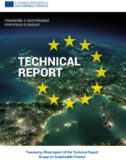This week, the Technical Expert Group on Sustainable Finance (TEG), has published its final recommendations to the European Commission on the EU taxonomy, building on its June report and the open call for feedback completed last year. The taxonomy sets out for investors what economic activities can be considered to be compatible with the EU’s climate change plans and targets.
- The report marks an important step towards the delivery of a climate neutral economy by 2050. Among the changes since the last draft, the TEG has substantially expanded the criteria for climate adaptation and revised most substantively the criteria for Buildings, Forestry and Manufacturing activities. E3G will complete a full analysis of the report in the coming hours/days.
- The updated technical criteria set robust expectations for the future environmental integrity of financial assets and products. This responds to increasing calls from citizens for strong environmental action and illustrates the ambitions of the European Green Deal. The European Commission should transpose this work directly into the Regulation to establish the taxonomy by the end of year, through a process of drafting Delegated Acts. In addition, the European Commission will explore how the taxonomy can be used by the public sector, building on work already underway on climate-proofing the EU budget instruments.
- The finance community can begin to use the taxonomy even in advance of legislation, on the basis of substantial new user guidance provided today. This will enable financiers to get ahead of legal enforcement and exploit the huge market opportunity to offer sustainable investment products. The European Investment Bank has already announced that it will lead the way.
- This report will set the global benchmark for defining what is ‘sustainable’ in the context of the Paris Agreement and global ambitions for net-zero emissions by 2050. COP26 in Glasgow will provide an opportunity for the International Platform on Sustainable Finance (set up at the UN General Assembly last September) to enhance international coordination using this framework as the best practice.
Sandrine Dixson-Declève, Senior Associate at E3G, Member of the Technical Expert Group on Sustainable Finance and the ClimateKIC Advisory Board: “The TEG’s final recommendations reflect the huge efforts put into this work by the members themselves, the hundreds of additional experts and the public advice inputted through our consultations. It has been extensive and today is a great collective achievement.” “The European Commission should transpose this work directly into the Regulation to establish the taxonomy by the end of year. This framework will help to get the EU, its capital and businesses on track to deliver of a climate neutral net-zero greenhouse gas emissions economy by 2050.”
Tom Jess, Policy Advisor at E3G said: “The attention given by the TEG to expanding the criteria for climate adaptation reflects the urgency of the climate crisis. The robust and vast research presented today should be picked up immediately by investors, businesses and policy makers. There is no reason not to. The sustainability metrics and thresholds presented today should be reflected across all the policy instruments of the European Green Deal and used to enhance international coordination at COP26. The success of the framework will really be determined by how widely it is used, not only in Europe but around the world.”




